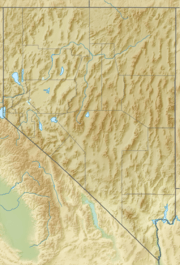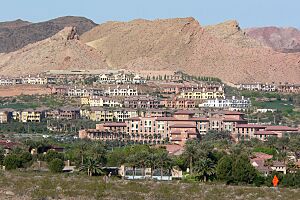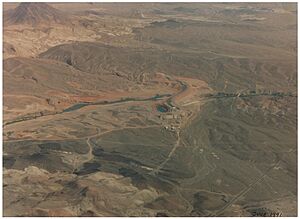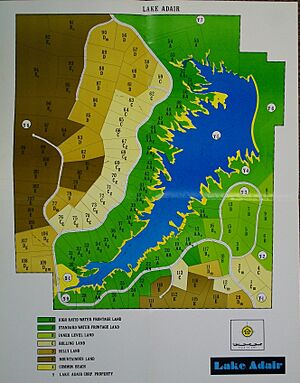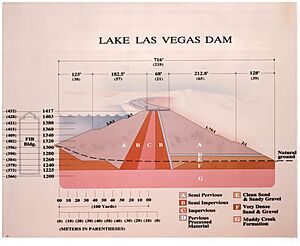Lake Las Vegas facts for kids
Quick facts for kids Lake Las Vegas |
|
|---|---|
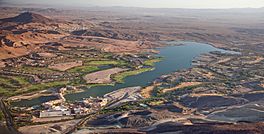 |
|
| Location | Henderson, Nevada |
| Coordinates | 36°06′07.2″N 114°55′46.2″W / 36.102000°N 114.929500°W |
| Type | Reservoir |
| Primary inflows | Primary: WWII BMI Pipeline, raw Lake Mead water. Secondary: Up to 2000 AFY stormwater flow from Las Vegas Wash. Emergency: SNWS treated water from Lake Mead |
| Primary outflows | Las Vegas Wash, golf course irrigation, evaporation |
| Catchment area | nil |
| Basin countries | United States |
| Surface area | 320 acres (130 ha) |
| Shore length1 | 10 mi (16 km) |
| Surface elevation | 1,400 ft (427 m) |
| Islands | 0 |
| Settlements | Lake Las Vegas |
| 1 Shore length is not a well-defined measure. | |
Lake Las Vegas is a large, man-made lake located in Henderson, Nevada. It's a reservoir, which means it's a place where water is stored, often behind a dam. The lake covers about 320 acres, and there's a much larger developed area of 3,592 acres around it. This whole area is sometimes called the Lake Las Vegas Resort.
Around the lake, you'll find three main resorts: the Aston MonteLago Village Resort, the Westin Lake Las Vegas Resort, and the Hilton Lake Las Vegas. These resorts offer places for people to stay and enjoy the lake.
Contents
About the Lake and Dam
Lake Las Vegas was created by building a huge earthen dam. This dam is 192 feet (about 58 meters) tall. It stretches for 4,800 feet (about 1,463 meters) and is 716 feet (about 218 meters) wide at its base. Imagine, it holds about the same amount of dirt as the famous Hoover Dam holds concrete!
The dam holds back 10,000 acre-feet of water. An acre-foot is the amount of water needed to cover one acre of land to a depth of one foot. That's a lot of water!
How Water Flows Around the Lake
The lake was built in the path of the Las Vegas Wash. This wash is like a natural riverbed that carries stormwater away from the valley. To make sure the wash could still flow to Lake Mead, two large pipes, each 84 inches (about 2.1 meters) wide, were built under the reservoir and dam.
These pipes help the Las Vegas Wash stay connected to Lake Mead. In 2009, these important pipes needed repairs, which cost $3 million. Above the entrance to these pipes, there's a special structure that helps control floods. If there's too much storm water in the Las Vegas Wash, some of it can be sent into Lake Las Vegas to prevent flooding elsewhere.
History of Lake Las Vegas
The idea for Lake Las Vegas started a long time ago, in 1965. A person named J. Carlton Adair bought some land near Lake Mead. He wanted to build a resort there. However, the National Park Service, which manages national parks, didn't want a resort in that area.
The Land Exchange
Eventually, a special law was passed by the government. This law allowed Adair to trade his land near Lake Mead for a different piece of land. This new land was 2,243 acres in the Las Vegas Wash, right next to the National Park Service area. The main reason for this trade was to build a dam and a lake with resorts. This project was first going to be called Lake Adair. There was even a plan to change the name of the city of Henderson to "City of Lake Adair" once the lake was full!
Building the Lake
In 1967, Adair hired engineers to design the dam and the bypass pipes for Lake Adair. But he couldn't find enough money to build it. Later, another developer named Barry Silverton took over the project. He gathered many of the original landowners and renamed the project "Lake At Las Vegas." Silverton continued with the planning and getting permits.
Still, Silverton also struggled to find enough money. In 1987, he sold most of his shares in the project to a company called Transcontinental Properties, led by Ronald Boeddeker. Transcontinental Properties then continued the difficult process of getting approval to build the dam and bypass system. It was a long process with many challenges.
Finally, a construction company was hired. In 1991, after the dam was fully inspected, water from Lake Mead began to fill the reservoir. The State Engineer also approved a plan for Lake Las Vegas to use 2,000 acre-feet of stormwater each year. This meant the lake could use runoff from storms to replace water lost to evaporation. This stormwater would otherwise flow into Lake Mead and the Colorado River, which are federal waters.
Development and Changes
In 1995, Henry Gluck, who used to lead a big company called Caesars World, joined Transcontinental Properties. With the help of two wealthy brothers, Sid and Lee Bass, they developed the new community. The entire project cost about $5 billion.
Over the years, the ownership and management of Lake Las Vegas changed. In 2008, the company that owned Lake Las Vegas had financial difficulties. However, the development successfully recovered in 2010. This allowed unfinished parts of the project to be completed.
Some of the resorts at Lake Las Vegas have also changed names. For example, the Ritz Carlton, Lake Las Vegas, closed in 2010. It reopened in 2011 as the Ravella at Lake Las Vegas. Then, in 2013, it was renamed the Hilton Lake Las Vegas, which is its name today.
 | Leon Lynch |
 | Milton P. Webster |
 | Ferdinand Smith |


